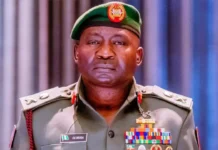The Chief of Army Staff, Lt. Gen. Taoreed Lagbaja, affirmed on Thursday that the Nigerian Army remains committed to addressing security challenges in the Southeast and other regions with strict adherence to established protocols.
He emphasized that the Army will respond firmly to armed groups wielding military-grade weapons to safeguard civilians.
Speaking at the Headquarters of the 6 Division of the Nigerian Army in Port Harcourt, Rivers State, Lagbaja inaugurated projects overseen by Maj.-Gen. Jamal Abdussalam, the General Officer Commanding, marking the conclusion of the Chief of Army Staff Second Commanding Officers’ Workshop which commenced earlier in the week.
Lagbaja underscored the Army’s readiness to swiftly counter security threats in line with constitutional provisions and operational guidelines.
He highlighted ongoing efforts to tour various formations and units under the 6 Division, aiming to reinforce peace and stability.
“The Army is resolute in upholding our code of conduct and rules of engagement,” stated Lagbaja. “We will respond decisively to any security threat, particularly against those openly carrying military-grade weaponry, ensuring the safety of law-abiding citizens, our deployed assets, and the lives of our personnel.”
During his tour, Lagbaja noted improvements in security within the 6 Division’s jurisdiction, crediting the dedication of troops and support from local stakeholders and government authorities.
Read Also:
He expressed gratitude to stakeholders for their cooperation and timely information, while acknowledging the Rivers State Government for facilitating an enabling environment and logistical support crucial for effective operations.
Lagbaja also highlighted the significance of the workshop themed “Enhancing Tactical Level Command and Leadership in a Joint Environment.”
The event aimed to equip commanding officers with essential skills and enhance their performance amid complex security dynamics.
Reflecting on the workshop’s outcomes, Lagbaja emphasized its role in aligning with his vision to transform the Nigerian Army into a proficient and motivated force capable of fulfilling constitutional obligations across diverse operational environments.
“The discussions underscored the importance of tactical command and leadership in today’s security landscape, focusing on training directives, civil-military cooperation, and digital innovation,” Lagbaja noted.
He urged officers to navigate contemporary challenges, including the impact of social media and demographic shifts, emphasizing the need for innovative administrative strategies and robust training practices.
“In cultivating synergy across security stakeholders, it is imperative to uphold ethical standards while adapting to technological advancements,” Lagbaja advised, urging officers to prioritize continuous training and performance excellence.
As the Army continues its mission to enhance security and support national development goals, Lagbaja reaffirmed his commitment to ensuring sustained progress and effectiveness in military operations nationwide.













